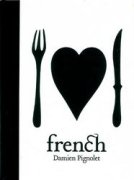Cooking Pleasure: Interview with Chef Damien Pignolet
by anna battista

Cooking is universally considered as a form of art. Some are lucky enough to be born into families who seem to have a passion for food ingrained in their DNA; others acquire a taste for food as they grow up. Australian Chef Damien Pignolet falls into both the categories: in his book French he remembers how each day dinner was seen by his family as a sort of ceremony, and how, as he grew up, he had the opportunity to turn the passion for food his family had passed him into a profession.
After leaving school Pignolet enrolled in a college course in hospitality that also included training in haute cuisine and practical cookery, and, later on, started working at a Melbourne cooking equipment store and school. In 1979 he moved to Sydney where he worked at the Pavilion on The Park restaurant located on the edge of Sydney’s Royal Botanic and Domain Gardens. After a few years Pignolet bought with his wife his first restaurant, Claude’s and, in the early ‘90s, he moved to another venture, Bistro Moncur. In 2004 he also became executive chef and co-proprietor of the Bellevue Hotel and Dining Room in Sydney.
Pignolet’s French style of cooking derives directly from his ancestors who migrated from France to Australia at the end of the 1800s. “My passion for learning the culinary art and for food developed at a very early age and came from my mother,” Pignolet remembers. “She cooked with technical skills, but also with passion. Everything she touched tasted delicious, to give food was to give love for her and this motto has fuelled my career.” Pignolet‘s passion for food has also generated a passion for teaching how to cook well, a thing he has done for the last 30 years. “I always try to teach to my staff that the greatest pleasure we have is to cook beautifully, to serve our customers exquisite food and to offer them an excellent service,” he explains, “you must always remember that cooking is about passion, not about money. The most exciting thing of teaching is to know that people are going to cook what they are taught, it’s a fantastic feeling.”
According to Pignolet, there’s only one way to become a chef and that’s doing an apprenticeship in a restaurant while attending college perhaps once a week, and follow this routine for 3 to 5 years. “The young people who work with me are ‘apprentice chefs’, they are learning the craft of cooking and one day they might be in charge of a section of a kitchen and then they might be called chefs,” he says, “I find ridiculous how in some countries such as the UK people who have never received any training or never worked in a restaurant, are given a job in a kitchen and are called ‘chefs’.”
Pignolet’s latest venture is not a new restaurant but a cookbook, his first volume of recipes: entitled French, this beautifully illustrated tome is written in the style in which professionally trained chefs learn to cook. Techniques are explained, methodologies analysed, ingredients smelled and tasted. It took him just over 12 months to write French and he completed it alternating his work as chef to writing, while sleeping very little. “I wrote the book as if I was cooking, as if I was telling somebody what to do in the kitchen, as I wanted to try and capture the essence of cooking without frightening the readers,” he states.
Now Pignolet hopes French will do well in Australia, a country he loves for the variety of food and restaurants it offers, “Your are spoilt for choice when it comes to restaurants and what you can find in supermarkets is amazing,” he claims. ”Australia is a young country and doesn’t come from a regimented background, this is why it is very interested in experimenting with food and why this is a great place where to cook and eat.”
Many chefs decide to go global once they become famous, opening chains of restaurants in Rome, London, Paris and New York, but Pignolet doesn’t have any plans at present. “It would be good,” he admits, “but having one business around the corner from the other is one thing, having one across the world from the other is extraordinarily hard as you don’t know what’s going on over there.”
When he needs inspiration, but also consolation, Pignolet usually refers to cookbooks, and, in particular, to two volumes, French Provincial Cooking by Elizabeth David and to The Cook's Companion by Stephanie Alexander. “If you can get into the writing and style of David’s book, you’ll learn so much from it,” Pignolet explains, “the knowledge it contains is unbelievable, the research extraordinary. It’s the sort of book that should be looked at for technical matters and deep understanding, at least once a week, possibly more. Alexander’s book is also one of the best books ever written, it features 1,400 recipes and it’s the sort of book that answers all your cookery and food questions.”
Apart from choosing the right cookbooks to get inspired in the kitchen, Pignolet has got a last piece of advice for aspiring chefs: cooking slowly and carefully. “One of the mistakes people tend to do is they attempt too much,” he says, “whereas they should concentrate on doing something simple and in doing it beautifully, starting for example with an easy dish such as melone and prosciutto. The secret of doing things slowly and carefully to achieve terrific results is always to imagine you are cooking for one person with a great palate: try to keep this in mind and you will be a great cook and excel in the kitchen.”
For Pignolet food is pleasure and cooking is something that should give you joy and satisfaction. You’d better believe him, after all he’s one of Australia’s finest chefs and restaurateurs.
Copyright (c) 2006 erasing clouds |
|